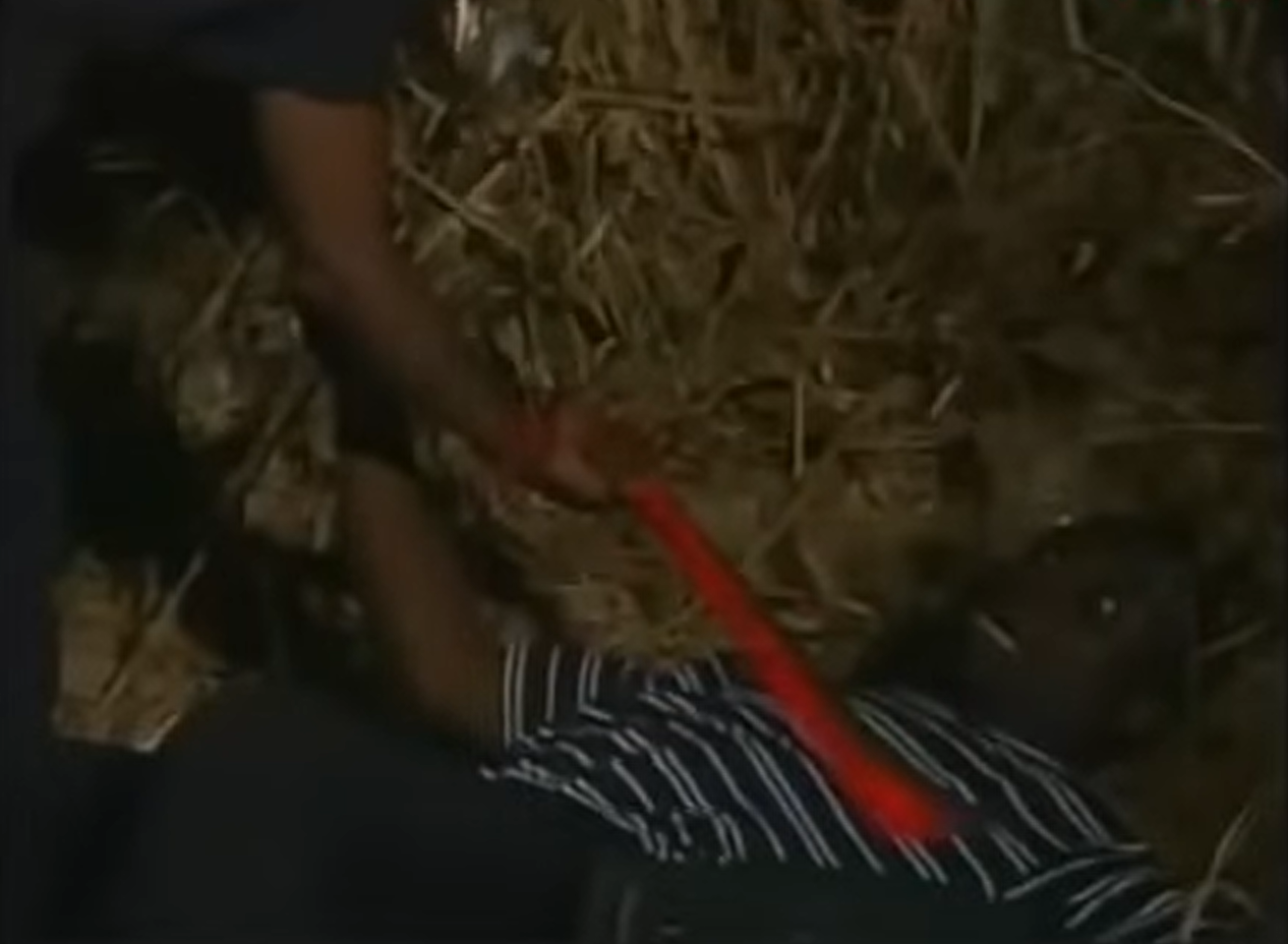Issakaba and jungle justice, My Nollywood Nostalgia
Issakaba asks the right questions about the dispensation of justice but offers only simple answers.
When a mob killed four students of the University of Port Harcourt in 2012, video clips of the dehumanising event went viral and the world cringed in horror.
Ugonna Obuzor, Lloyd Toku, Chiadika Biringa, and Tekena Elkanah had paid a late-night visit to Aluu community to recover a debt, but the debtor raised an alarm to accuse them of theft.
Without proper investigation, the community and its vigilantes chased down and caught the students, savagely brutalised them, and burnt them to death.
I was a university student at the time of the Aluu 4 incident, and I found it impossible to watch any of the video clips for more than five seconds. It was a harrowing degradation of human life, and jungle justice at its most brutal.
But if it had happened 10 years before 2012, when I was maybe 10 years old, I would have cheered the mob in ignorance, and there's one classic Nollywood film to blame for my childhood bloodlust: Issakaba.
![In Issakaba, vigilantes are judge, jury, and executioner [YouTube/Brain Planet TV]](https://ocdn.eu/images/pulscms/MDk7MDA_/5153566a7c7de165373b673d2e52ebc6.png)
The Lancelot Imasuen production is about a vigilante group dedicated to fighting crimes to protect communities the police have failed.
Sam Dede is Ebube, the field leader of this group of vigilantes whose work is remarkably aided by metaphysical charms that put them on an equal footing with armed robbers, kidnappers, ritual killers, and other criminals they face.
Something about the writing of the events of Issakaba creates a righteous mien for vigilantism despite its attendant harm to law and order in society.
![They're like the Avengers, but with a really limited budget [YouTube/Brain Planet TV]](https://ocdn.eu/images/pulscms/YTQ7MDA_/c53d9401f7a0eb48b4c5e953c5499f89.png)
Ebube's Issakaba members savagely brutalise and murder multiple criminal suspects and conduct themselves as judge, jury, and executioner, sometimes in only a matter of minutes. The film provides them a cop-out by establishing that their supernatural power gives them 100% assurance their victims are never innocent.
They have a trick for determining that someone is evil, even if not caught committing a crime — when a silver cutlass is placed on a suspect's chest and it turns blood red, the suspect should probably say last prayers.

Issakaba justifies savage beatings, beheadings, and other extrajudicial actions of its vigilante heroes by assuring its audience their victims deserve it. After all, why should you care too much that a murderer is also murdered? You should cheer!
There's just one problem: this is not how real-life vigilantism works, and that inconvenient detail is probably even more uncomfortable when you realise the film is based on dramatised actions of a real vigilante group known as the Bakassi Boys.
Just like their onscreen adaptations, the real Bakassi Boys, who operated in Nigeria's Southeast region, usually determined who was evil or not with dark magic and the colour disposition of their signature cutlasses.
They were created in the 1990s as a necessary instrument to fight the region's rising crime rate and were considered very effective. But they also faced numerous allegations of human rights abuses committed with flimsy evidence of wrongdoing on the part of their victims. An investigation by Human Rights Watch chronicled witness testimonies of how they illegally detained dozens of people and killed them.
![Issakaba appeals to the gratification of quickly-dispensed justice [YouTube/Brain Planet TV]](https://ocdn.eu/images/pulscms/M2U7MDA_/2615a2e83d6ec514defdc30ebe5d6629.png)
Jungle justice, in the way Nigeria struggles with it, is a combination of many factors, and one of the most significant of them is the public's frustration with the administration of justice. Issakaba feeds into this by using characters in positions of authority abusing their power to perpetrate evil or being positioned as incompetent to deal with it as efficiently as the vigilante group operating by the rules of the jungle. The character of a high-ranking police officer who's secretly a gun runner for the criminals in the community is one of the film's ways of driving this home.
It'd be disingenuous to imply Issakaba only glorifies jungle justice and does not attempt to tell the story of vigilantism with some nuance. The third part of the film explores the group's internal conflict regarding killing suspects or handing them over to the police for the type of justice that requires due process and patience.
So Imasuen's retelling of the Bakassi Boys' exploits isn't a complete whitewash. Still, it just doesn't commit to the complexity of the subject enough in a way that a 10-year-old would understand that vigilantism isn't as righteous as it appears when dramatised on the screen.
![Issakaba provided Sam Dede with a career-defining role [YouTube/Brain Planet TV]](https://ocdn.eu/images/pulscms/Yjk7MDA_/86dd5e9696e13ceb1406a14c2767e5a3.png)
Issakaba still mostly keeps the main group's actions sanitised and appeals to the gratification of quickly-dispensed justice, an attitude that feeds real-life mob action as was seen in Aluu a decade after the film's release.
That same ugliness has repeated itself in Nigeria over and again, as recently as the gratuitous lynching of Deborah Samuel, a student of Shehu Shagari College of Education, Sokoto, brutally stoned to death by fellow students who accused her of blasphemy.
Issakaba is one of Nollywood's most iconic films because it strongly explores a subject that's not only very real but is an evergreen conflict of the human condition. It asks the right questions about the dispensation of justice but offers only simple answers that potentially cloud the pitfalls of jungle justice.
For a 10-year-old watching Issakaba, it was easy to cheer for a dramatised version of jungle justice, but real life is a bit more complicated.
ALSO READ: How 'Lagidigba' created a radical feminist icon — and crushed her

Post a Comment